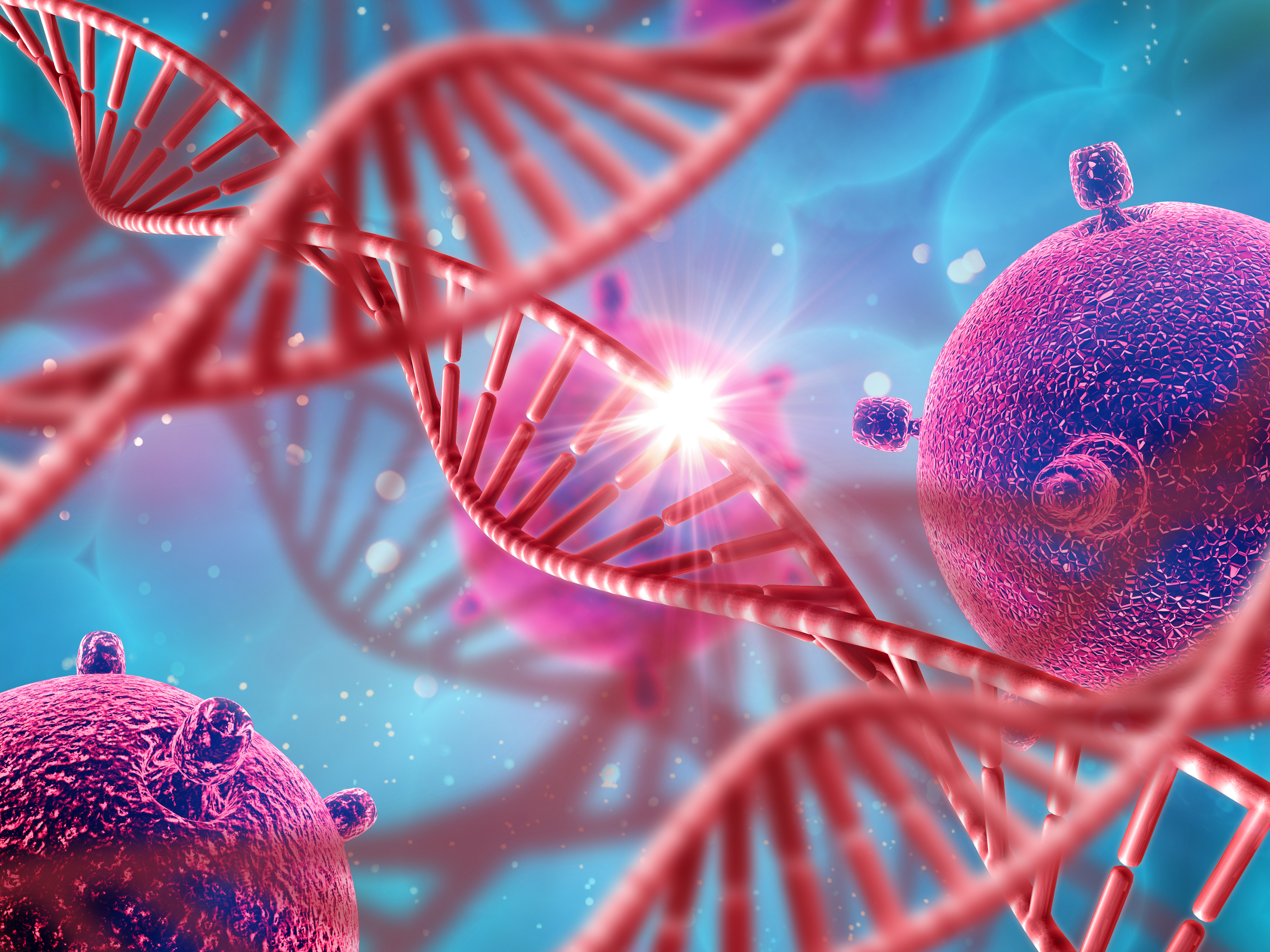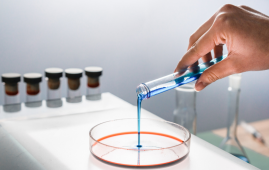

University of Maryland School of Medicine (UMSOM) researchers engineered a new type of CAR T-cell therapy that, in preclinical studies, selectively attacked cancer cells while sparing healthy cells, potentially reducing the likelihood of toxic side effects from this innovative cancer treatment. The cells were designed specifically to attack multiple myeloma, a cancer of the plasma cells found in the body’s bone marrow.
Results were published in the journal Science Translational Medicine.
“We could see clearly in our preclinical studies that this new therapy efficiently eliminated the tumor cells without attacking healthy cells. We’re very optimistic about the potential of this as a new and safer cancer treatment,” said study corresponding author Tim Luetkens, MD, Assistant Professor of Microbiology and Immunology at UMSOM.
According to the National Cancer Institute, around 35,000 Americans are diagnosed with multiple myeloma each year, with approximately 40% of patients dying within 5 years. There are presently two CAR T-cell treatments for multiple myeloma on the market that can hold the disease at bay for an average of three years. These treatments bind to specific target proteins on the surface of cancer cells using the patients’ own genetically modified immune cells. While the current CAR T-cell treatments for multiple myeloma show promising outcomes, many patients still relapse, highlighting the need for novel treatments.
Dr. Luetkens, Djordje Atanackovic, MD, Professor of Medicine at UMSOM, and Sabarinath Radhakrishnan, MD, Assistant Professor at the Medical College of Wisconsin previously published a new CAR T-cell approach that targets a different protein than current CAR T-cell therapies in Nature Communications. They opted to concentrate on a protein called CD229, which is abundant in multiple myeloma cancer cells but rare in healthy cells. They did, however, show that CD229 CAR T cells continued to assault some healthy blood cells, a potentially dangerous toxic side effect.
Dr. Luetkens and his colleagues used a sophisticated approach called affinity tuning to produce CD229 CAR T cells that only target cancer cells while sparing healthy cells in the current study. They examined 305 distinct versions, swapping out single amino acids to find the ideal CAR T-cell sequence that would strike the sweet spot: rapidly detecting cancer cells while disregarding healthy ones.
The researchers were first unhappy to discover that the optimized receptor or CAR that they had created caused the CAR T cells to proliferate more slowly. This delayed growth could, in principle, make the therapy less beneficial in patients. The research team was able to overcome this obstacle by adding a new technique devised by Stanford University experts.
“Providing additional copies of a protein naturally present in our CAR T cells, called c-Jun, allowed them to actually grow normally and attack cancer cells over a long period of time,” said study lead author Erica Vander Mause, PhD, who was a researcher in Dr. Luetkens lab during the study.
Dr. Luetkens and Dr. Atanackovic are both members of the immunology and immunotherapy research program at the University of Maryland Marlene and Stewart Greenebaum Comprehensive Cancer Center (UMGCCC), a regional and national leader in CAR T-cell therapy treatment. Since the FDA approved the first CAR T-cell therapy in 2017, the institute has treated over 300 patients with blood malignancies such as large B-cell lymphoma, leukemia, and multiple myeloma.
“Clinical studies are currently being initiated at UMGCCC and partnering institutions to investigate, as a first step, the safety and efficacy of CD229-targeted CAR T cells for the treatment of multiple myeloma and possibly also other malignancies,” said Dr. Atanackovic.
The University of Maryland Medical Center was the first cancer center in Maryland, Virginia, and Washington, D.C. to be certified to provide CAR T-cell treatment to patients with aggressive lymphoma. Many of these patients had relapsed or refractory blood malignancies, leaving them with no alternative options for treatment. More over half of the patients who received the therapy are still alive; others have been cured for five years.
In addition, UMGCCC has a strong preclinical and clinical cellular therapy research program, with physician-scientists exploring next-generation CAR T-cell treatments for blood malignancies and select solid tumors. As in the last study, the researchers are also attempting to lessen the treatment’s hazardous side effects while increasing its effectiveness. The Fannie Angelos Cellular Therapeutics Laboratory, located at UMSOM, has the distinction of having its own state-of-the-art GMP-compliant processing facility capable of creating innovative cell-based therapeutics and cancer vaccines.
“Optimal CAR binding strength remains an open question in the CAR T cell field, with low-affinity CAR T cells often showing better long-term effectiveness and safety,” UMSOM Dean Mark T. Gladwin, MD, Vice President for Medical Affairs, University of Maryland, Baltimore, and the John Z. and Akiko K. Bowers Distinguished Professor. “This research provides a flexible platform to take existing CARs and optimize their binding strength to potentially make these therapies safer and more effective for different types of cancers.”
more recommended stories
 Can Ketogenic Diets Help PCOS? Meta-Analysis Insights
Can Ketogenic Diets Help PCOS? Meta-Analysis InsightsKey Takeaways (Quick Summary) A Clinical.
 Silica Nanomatrix Boosts Dendritic Cell Cancer Therapy
Silica Nanomatrix Boosts Dendritic Cell Cancer TherapyKey Points Summary Researchers developed a.
 Vagus Nerve and Cardiac Aging: New Heart Study
Vagus Nerve and Cardiac Aging: New Heart StudyKey Takeaways for Healthcare Professionals Preserving.
 Cognitive Distraction From Conversation While Driving
Cognitive Distraction From Conversation While DrivingKey Takeaways (Quick Summary) Talking, not.
 Fat-Regulating Enzyme Offers New Target for Obesity
Fat-Regulating Enzyme Offers New Target for ObesityKey Highlights (Quick Summary) Researchers identified.
 Spatial Computing Explains How Brain Organizes Cognition
Spatial Computing Explains How Brain Organizes CognitionKey Takeaways (Quick Summary) MIT researchers.
 Gestational Diabetes Risk Identified by Blood Metabolites
Gestational Diabetes Risk Identified by Blood MetabolitesKey Takeaways (Quick Summary for Clinicians).
 Phage Therapy Study Reveals RNA-Based Infection Control
Phage Therapy Study Reveals RNA-Based Infection ControlKey Takeaways (Quick Summary) Researchers uncovered.
 Pelvic Floor Disorders: Treatable Yet Often Ignored
Pelvic Floor Disorders: Treatable Yet Often IgnoredKey Takeaways (Quick Summary) Pelvic floor.
 Urine-Based microRNA Aging Clock Predicts Biological Age
Urine-Based microRNA Aging Clock Predicts Biological AgeKey Takeaways (Quick Summary) Researchers developed.

Leave a Comment